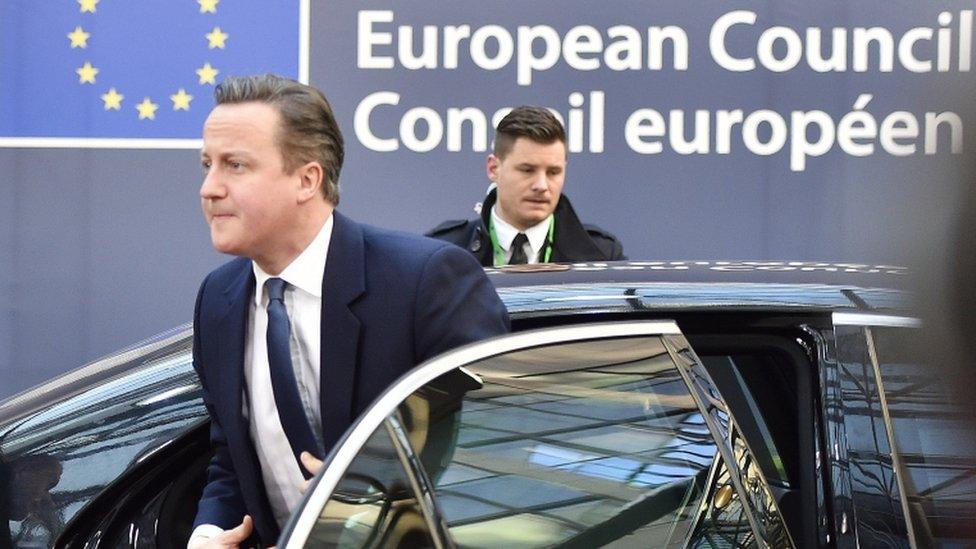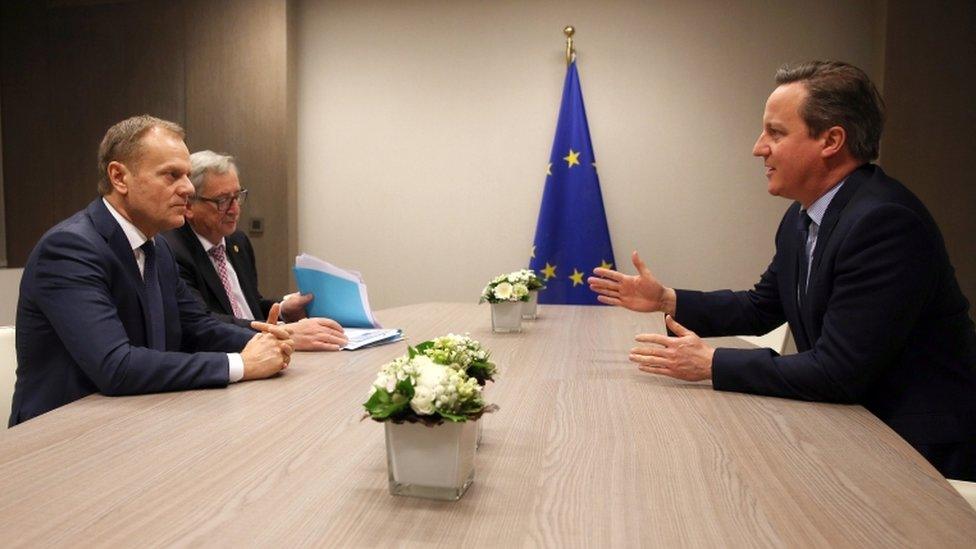EU summit: SNP warns Cameron as talks continue
- Published

Mr Cameron arrived for fresh talks on Friday morning just hours after the first round of discussions ended
David Cameron is playing a high stakes game that risks leaving Scots "at the exit door of the EU", Scotland's external affairs secretary has said.
Fiona Hyslop was speaking as the prime minister started a second day of talks in Brussels.
Mr Cameron is trying to secure the deal he wants ahead of holding an in/out referendum on the UK's EU membership.
But Ms Hyslop said the focus should be on the EU's "positive influence" rather than the "minutia" of the summit.
Mr Cameron has said he would be "battling for Britain" during the Brussels summit, which started on Thursday and has now resumed for a second day.
But he has stressed he would not agree to a deal that "doesn't meet what we want".
European Council President Donald Tusk said there had been "some progress" but "a lot still remains to be done" despite Thursday's negotiations going on through the night.
Mr Cameron's Eurosceptic critics have branded the process a sham, saying that even if the reforms are agreed they will not allow the UK to block unwanted EU laws or affect the scale of EU migration.
The SNP government and all four opposition parties in the Scottish Parliament want the UK to remain a member of the EU.
And polls have suggested the EU is more popular in Scotland than elsewhere in the UK.
Ms Hyslop told the BBC's Good Morning Scotland programme: "This is high stakes by David Cameron, but I think it is probably low impact in terms of the changes he will get.
"He is risking putting Scotland at the exit door of the European Union and that is just not acceptable."

Analysis by Struan Stevenson, former Scottish Conservative MEP

Mr Cameron held talks with European Council President Donald Tusk, left, and European Commission President Jean-Claude Juncker, second left, on Thursday
If this is political theatre, it is certainly putting David Cameron through the ringer - the talks went on until about 05:00 Brussels time.
I have sat through some of these all-night meetings in Brussels before. Tempers get increasingly frayed and they were going to go back into a session at about 10:00 Brussels time this morning.
They will have had very little sleep, they will be a bit grumpy and many people are saying this is the last opportunity for getting a deal.
If we don't get a deal today we are going to have to come back to a special summit, probably later this month, or there is a scheduled summit on 17 March.
People will come back to those summits and they are going to be increasingly angry with Britain for creating this hiatus.
This is history in the making, and I really hope that they do come to a decision today.
Many people speculated that it would be what they call a two-shirt summit meeting, some even said it could go on until Saturday and be a three-shirt summit meeting.
But I think they will probably come to their senses later today.

Ms Hyslop added: "At the end of the day what is going to be on the ballot when we get to the referendum will be about whether we want to remain or whether we want to leave.
"And it is the bigger picture that I think is far more important in terms of the future.
"We have had 40 years of being part of the European Union and we think that is a positive influence not just for us but for the rest of the world, and we should be getting on to that agenda rather than the detail, the minutia, of the negotiations."
How does the European Union work?
Ms Hyslop said she believed that everybody involved in the Brussels talks wanted a deal to be done.
But she defended the Scottish government's refusal to campaign alongside Mr Cameron for the UK to remain in the EU, saying its vision of Europe's future was "very different" from that of the prime minister.
And she denied there was a contradiction between wanting to remain a part of the EU while wanting to leave the United Kingdom.
UKIP has pledged to campaign in Scotland for a so-called Brexit, which First Minister Nicola Sturgeon has predicted could spark a second referendum on Scottish independence.
Earlier this week, a leading expert on the EU said Holyrood would be handed a raft of new powers over areas such as the environment, agriculture and fishing if the UK was to leave the EU.

What does Mr Cameron want from the summit?
The key parts of the UK's proposed deal include:
Allowing Britain to opt out of the EU's founding ambition to forge an "ever-closer union" of the peoples of Europe, and greater powers for national parliaments to block EU legislation
Restrictions on other EU nationals getting in-work benefits in the UK for a period after they arrive in the UK; changing child benefit rules so payment reflects cost of living in the country where the child resides
Explicit recognition that the euro is not the only currency of the EU and guarantees to ensure countries outside the eurozone are not disadvantaged or have to join eurozone bailouts
A target for the reduction of the "burden" of excessive regulation and extending the single market